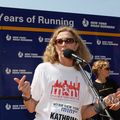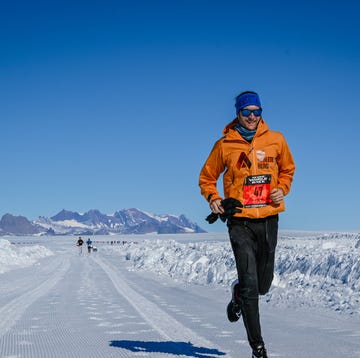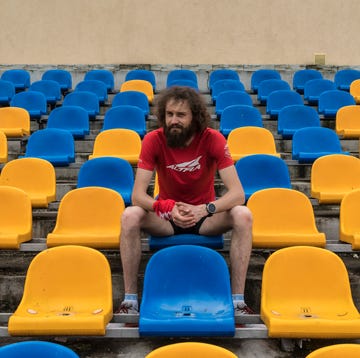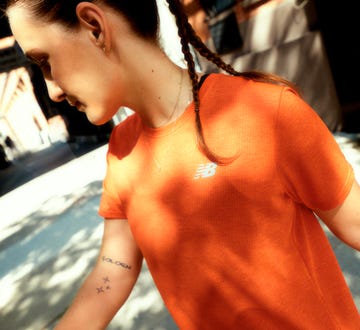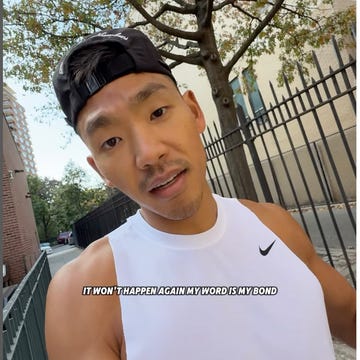On a dark six-mile run in a wild snowstorm in mid-December 1966, I had a terrible argument with my otherwise kindly old coach, Arnie Briggs. It was in Syracuse, New York, where God first invented snow and never let up. I was a 19-year-old journalism student at Syracuse University, and since there was no women's running team there or anywhere else for that matter, I began training unofficially with the men's cross-country team.
That's where I met 50-year-old Arnie, who had trained for years with the team. Arnie was actually the university mailman and a veteran of 15 Boston Marathons. He was excited to see a woman--the first--come out to run, and took slowpoke me under his training wing. To cajole me through tough evening sessions like this, Arnie told and retold stories of famous Bostons. I loved listening to them--until this night when I snapped and said, "Oh, let's quit talking about the Boston Marathon and run the damn thing!"
&Marathon Woman: Running the Race to Revolutionize Womens Sports.
"Why not? I'm running 10 miles a night!"
Arnie insisted the distance was too long for fragile women to run and exploded when I said that Roberta Gibb had jumped into the race and finished it the previous April.
"No dame ever ran the Boston Marathon!" he shouted, as skidding motorists nearly killed us. Then he added, "If any woman could do it, you could, but you would have to prove it to me. If you ran the distance in practice, I'd be the first to take you to Boston." I grinned through the gloom and flakes. Hot damn, I thought, I have a coach, a training partner, a plan, and a goal: the biggest race in the world--Boston.
Three weeks before the marathon, Arnie and I ran our 26-mile trial. As we came down our home stretch, it felt too easy, so I suggested that we run another five-mile loop just to feel extra confident about Boston. Arnie agreed, reluctantly. Toward the end of our 31-mile run, he began turning grey. When we finished, I hugged him ecstatically--and he passed out cold. The next day Arnie came to my dorm and insisted that I sign up for the race. He said it was wrong to run without registering and, besides, I could get in serious trouble with the Amateur Athletic Union, our sport's strict governing body.
We checked the rule book and entry form; there was nothing about gender in the marathon. I filled in my AAU number, plunked down $3 cash as entry fee, signed as I always sign my name, "K.V. Switzer," and went to the university infirmary to get a fitness certificate. (Unlike today, the marathon did not require qualifying times then.) Arnie got the travel permits and mailed our entries. Two weeks later, my boyfriend, a 235-pound ex-All American football player and nationally ranked hammer thrower known as Big Tom Miller, announced that he was going to run Boston, too, and didn't need to train because "if a girl can run a marathon, I can run a marathon." Tom was an authority on all things athletic and would not be dissuaded. Then John Leonard, from the university cross-country team, decided to come, too. Talk about a pace team. I'd be running the toughest race of my life with three of the most talented athletes I knew.
In 1967, the Boston Marathon was Wednesday, April 19, Patriots' Day in the state of Massachusetts. I thought it was neat that folks in Massachusetts got a special holiday commemorating the young American patriots who fought the British in the first battles of the American Revolution. The marathon was made part of Patriots' Day in 1897, the year after the revival of the Olympic Games in Athens, when athletes came back from Greece telling of a romantic new event called the marathon. Part of what made the Boston Marathon special to me was its historical importance. I had no idea I was going to become part of that history. I wasn't running Boston to prove anything; I was just a kid who wanted to run her first marathon.
Tuesday afternoon Arnie picked up John, Tom, and me, and by 3 p.m. we hit the road for the five-hour drive to Boston. We found a motel in Natick, and after dinner Arnie insisted on showing us the course even though it was nearly 10 p.m. and freezing cold and rainy outside. He was excited at every landmark, saying things like "Here's Wellesley College!" when we couldn't see a thing out the steamy windows. The drive seemed an eternity, and I had this impending feeling of doom--here we were driving at 40 miles an hour and it was taking forever. Ever since that night I've never driven over a marathon course before the event. It is totally demoralizing to see how far 26 miles actually is.
I called my parents in Virginia when I got back to my room. I had to explain first what a marathon was, and then why I was in Boston, ending with, "It is important for me to finish the race." My dad had always been acutely sensitive when it came to any anxiety on my part; I never reached out with a lack of confidence unless it was serious. And he delivered perfectly. "Aw hell, kid, you can do it. You're tough, you've trained, you'll do great!"
It was just what I needed to hear. My dad knew I didn't jump into things untrained; although this marathon thing was a surprise, he had no doubt. What I couldn't explain to him, what nobody knows unless they've done one, is that the marathon is unpredictable, anything weird could happen, and anything could happen to me! I could get diarrhea. I could get hit by a dolt opening his car door--Arnie told me about that happening once. Eventually, I got too tired to worry about things I could not control. The thing I worried about most was courage. Would I have the courage to keep running if it really hurt, if it got harder than I was used to, if Heartbreak Hill broke me? I was worried about maybe not having the courage if it got awful.
The Boston Marathon started at noon, a great gift, as we slept in and didn't eat breakfast until 9. Arnie said to chow down; we needed a lot of fuel because it was a long day and cold outside. He wasn't kidding--it was freezing rain, with sleet and wind. So we ate everything: bacon, eggs, pancakes, juice, coffee, milk, extra toast.
Oddly, the weather didn't concern me; we'd trained five months in weather like this. What was annoying was that I had wanted to look nice and feminine at the start in my just-ironed burgundy shorts and top. We went back to our rooms, packed our stuff, and I carefully put on makeup and gold earbobs. Tom banged on my door holding out a sanitary napkin bag from the back of the toilet and a big safety pin. "Here, we're pinning these on the back of our gloves. They're perfect for holding dextrose tablets. See, you put four tablets in the bottom of the sack, rip off the top, fold it over, and pin it to your glove. When you need the dextrose, you rip it open."
&Published: Mar 26, 2007 12:00 AM EDT.
"It's sugar, for energy, get it?" he said in that tone that made me feel stupid. I had no idea sugar would give you energy anymore than, say, a piece of bread. Plenty of times I'd been hungry and tired on a run, but I never craved sugar or equated it to energy. I told him, "I don't need sugar; we never needed it before." It was just another complication; we had enough to worry about.
"How do you know? Just pin it, already." I shrugged. It was easier not to argue. Still, I felt idiotic, but when I got to the car, Arnie and John had sanitary napkin bags pinned to their gloves, too. What a team!
When we got to Hopkinton High School, the snow was really coming down. Since we'd pre-entered as a team, the race organizers had our stuff together for the team captain. A few minutes later, Arnie came out with the envelope and two number bibs each, to pin on our fronts and backs; they looked like cardboard license plates. We looked up our names in the printed start list and smiled at each other nervously. Seeing "K. Switzer" in print beside "261" gave me a little frisson. There were 741 people entered in the race, a huge race.
I pinned my numbers on my sweatshirt and not my burgundy top. It was the final commitment to wearing that warm sweatshirt for the whole race. I was pleased; the sweatshirt had been a buddy in Syracuse for several hundred miles and would live on another day, rather than dying at the roadside on the way to Boston. We started warming up. Everyone was darting about in different directions, all in grey sweat suits, some with hoods up, some with nylon windbreakers over them, some bare-legged, and some with shorts over the pants, a method of wearing sweats I never could understand. We all looked alike, like ragtags.
As runners jogged past, most kept their nervous eyes ahead, lost in prerace concentration, but plenty did double takes, and when they did I'd smile back or wave a little wave. Yep, I'm a girl, my look back said. Many of these guys turned right around and jogged over, all excited. "Hey! You gonna go the whole way?" "Gosh, it's great to see a girl here!" "Can you give me some tips to get my wife to run? She'd love it if I can just get her started." Arnie was kind of holding court with his "This girl ran me into the ground!" routine. He was shining. "See? I told you you'd be welcome at Boston," he said. Indeed, I felt very welcome. I felt special and proud of myself. I knew something other women didn't know, and I felt downright smug.
As we jogged over to the start, Tom said, "God, you're wearing lipstick!"
"I always wear lipstick. What's wrong with that?"
"Somebody might see you are a girl and not let you run. Take it off."
"I will not take off my lipstick."
And that's how we arrived at the start. There was a mob of runners in every getup imaginable funneling into a penlike area. At the gate of the funnel were clipboard-holding Boston Athletic Association officials wearing long overcoats with blue ribbons on the lapels and felt dress hats. Everyone was sodden; hats were gathering snow, as were the shoulders of the runners standing in the pen. It was pretty disorganized, and the officials were agitated. They were checking off bib numbers as runners came through the gate; I held up the big outer sweatshirt so they could check my number and the official put his hand on my shoulder and gently shoved me forward, saying, "C'mon runners, let's move on in, just keep it moving here!" We worked our way into the back of the field, and Arnie said, "See? No problem!"
All around us the men were pleased to have a woman in their presence. I tried to stay low-key; I sure didn't want any attention at this moment, but I tried to be accommodating, even when one runner insisted on having his wife, on the other side of the fence, take our photo together. Then the crowd quieted; someone up front must have been making announcements. We moved close together, and the smell of liniment was so strong that my eyes stung. The gun went off, and we were away at last.
Boston was always Mecca for runners. Now I, too, was one of the anointed pilgrims. After months of training with Arnie and dreaming about this, here we were, streaming alongside the village common and onto the downhill of Route 135 with hundreds of our most intimate companions, all unknown, but all of whom understood what this meant and had worked hard to get here. More than ever before at a running event, I felt at home.
The first few miles of every marathon are fun. The running is easy, the crowd noise is exciting, and your companions are conversational and affable. You know it's going to hurt later, so you just enjoy this time. So it was as we ran in our little group, four abreast, joking and saying thanks to the many well-wishers who passed us with encouragement. Arnie and Tom were in their element, running with me--a girl! All the positive encouragement gave them attention they had never had before. Tom ran with his chest stuck out, and even Arnie pranced; it was nice to see.
Then, just around mile two, came a honking of horns and someone shouting, "Get over, runners move to your right!" There was a lot of shuffling and some cursing as a big flatbed truck forced us all to the side of the narrow road. Following close behind the truck was a city bus. It was the photo press truck; on the back were risers so the cameramen could each get a clean shot as the vehicle pushed up to the front of the field. Suddenly, though, the truck slowed to be right in front of us, and the photographers were taking our pictures. In fact, they were getting pretty excited to see a woman in the race, a woman wearing numbers! I could see them fumbling to look up my number and name, and then shoot again. We all started to laugh and wave, it was our "Hi-Mom-on-the-nightly-news" moment, and it was fun.
A man with an overcoat and felt hat was then in the middle of the road shaking his finger at me; he said something to me as I passed and reached out for my hand, catching my glove instead and pulling it off. I did a kind of stutter step, we all had to jostle around him. I thought he was a nutty spectator, but when I passed I caught a glimpse of a blue and gold BAA ribbon on his lapel. Where had he come from?
Moments later, I heard the scraping noise of leather shoes coming up fast behind me, an alien and alarming sound amid the muted thump thumping of rubber-soled running shoes. When a runner hears that kind of noise, it's usually danger--like hearing a dog's paws on the pavement. Instinctively I jerked my head around quickly and looked squarely into the most vicious face I'd ever seen. A big man, a huge man, with bared teeth was set to pounce, and before I could react he grabbed my shoulder and flung me back, screaming, "Get the hell out of my race and give me those numbers!" Then he swiped down my front, trying to rip off my bib number, just as I leapt backward from him. He missed the numbers, but I was so surprised and frightened that I slightly wet my pants and turned to run. But now the man had the back of my shirt and was swiping at the bib number on my back. I was making little cries of aa-uh, aa-uh, not thinking at all, just trying to get away, when I saw tiny brave Arnie bat at him and try to push him away, shouting, "Leave her alone, Jock. I've trained her, she's okay, leave her alone!" And the man screamed, "Stay out of this, Arnie!" and swatted him away like a gnat.
Arnie knows this maniac, I thought wildly, as I tried to pull away. The air was filled only with the clicking whirr of motor-drive cameras, scuffling sounds, and faintly, one cameraman screeching something I couldn't understand. The bottom was dropping out of my stomach; I had never felt such embarrassment and fear. I'd never been manhandled, never even spanked as a child, and the physical power and swiftness of the attack stunned me. I felt unable to flee, like I was rooted there, and indeed I was, because the man, this Jock guy, had me by the shirt. Then a flash of orange flew past and hit Jock with a cross-body block. It was Big Tom, in the orange Syracuse sweatshirt. There was a thud--whoomph!--and Jock was airborne. He landed on the roadside like a pile of wrinkled clothes. Now I felt terror. We've killed this guy Jock. It's my fault, even though hothead Tom did it. My God, we're all going to jail. Then I saw Arnie's face--it was full of fear, too; his eyes were goggled and he shouted, "Run like hell!" All the adrenaline kicked in and down the street we ran, flying past the press truck, running like kids out of a haunted house.
I was dazed and confused. I'd never been up close to physical violence; the power was terrifying and I was shocked at how helpless I, as a strong woman, felt against it. Tom's precise execution, the way he took out Jock and only Jock, was sublime athleticism, but I was not grateful for the "save." I felt sick at heart, it was awful; it had gone too far, I wished Tom was not there, I wished I was not there.
Everyone was shouting. I could hear the journalists on the truck behind us yelling, "Go after her, go after her!" to the driver. The driver accelerated, popped the clutch, and I heard the truck buck and what unfortunately sounded like photographers, tripods, and crank cameras crashing down in a cursing melee.
Everyone was cursing, most loudly Arnie, the mild-mannered sweetheart, who proclaimed he was going to Kill That Jock Semple Who Should Know Better Being a Runner Himself! Tom really looked as if steam was coming out of his ears; he was still in full bombastic mode, and each curse of his was accompanied by another jab or a challenging look over his shoulder. John looked bewildered. I felt puke-ish, afraid that we'd seriously hurt this guy Jock Semple, and maybe we should stop and get it sorted out. But it was clear Jock was some kind of official--in fact, he turned out to be the race manager--and he was out of control. Now he's hurt, we're in trouble, and we're going to get arrested.
That was how scared I felt, as well as deeply humiliated, and for just a tiny moment, I wondered if I should step off the course. I did not want to mess up this prestigious race. But the thought was only a flicker. I knew if I quit, nobody would ever believe that women had the capability to run 26-plus miles. If I quit, everybody would say it was a publicity stunt. If I quit, it would set women's sports back, way back, instead of forward. If I quit, I'd never run Boston. If I quit, Jock Semple and all those like him would win. My fear and humiliation turned to anger.
The press truck caught up to us and hovered with its droning engine alongside, three feet away. Off the back and side the journalists began firing aggressive questions, and the photographers hung out close to get face shots. How quickly their tone had changed. Now it was "What are you trying to prove?" and "When are you going to quit?" Consequently, my tone changed, too. I was polite but no longer friendly. I made it clear that I was not trying to "prove" anything except that I wanted to run, I'd trained seriously for the distance, and I was not going to drop out. They wrote down what they wanted to write down. Clearly, they didn't believe me, as they stayed alongside. They thought it was a prank and didn't want to miss the moment when I'd give up. This made me even more resolved. In fact, it infuriated me.
Then, that bus came by. Standing on the floorboards and holding onto the outside door rail was Jock Semple! My God, he's alive! I thought. I was so relieved. But as the bus came by us, it slowed, and Jock, teeth bared again and shaking his fist, screamed in a Scottish brogue, "You all ere in beeeeeggg trooouble!" and all around us, men gave him the finger and shouted obscenities, and Arnie shouted, "Get out of here, Jock! Leave us alone!" I put my head down. I was not going to say a word. And with that, the bus accelerated with a huge cloud of stinking exhaust in our faces and sped away, blaring its horn for the runners to get out of its way.
Eventually, the press truck gave up when they saw I was not talking any more and drifted up toward the front of the race. It started to snow again. We were all deep in thought, and my thoughts were moving all over the place. I said quietly to Arnie, "You know that guy Jock has gone up ahead and is probably arranging for one of those big Irish cops to arrest us when nobody is looking. If it happens, I am resisting arrest, okay? And something else." I turned to Arnie and looked him in the eye. "Arnie, I'm not sure where you stand in this now. But no matter what, I have to finish this race. Even if you can't, I have to--even on my hands and knees. If I don't finish, people will say women can't do it, and they will say I was just doing this for the publicity or something. So you need to do whatever you want to do, but I'm finishing."
"Well, the first thing is to slow down! Forget about time, just finish!" Arnie now was the army sergeant. Tom, John, and I dropped the pace, dropped our arms, shook our hands. My left hand was wet and freezing, having lost my glove when the first BAA official pulled it off. And if your hands are cold, you are miserable all over. I pulled at the sleeve of my sweatshirt to cover my hand, but the sleeve wasn't long enough.
We were just falling into the rhythm of Arnie's stride and beginning to relax when Tom, still fuming, turned to me and blurted out, "You're getting me into all kinds of trouble!"
From Runners World for New Balance.
&A Renewed Relationship With Running
"I've hit an official, and now I'll get kicked out of the AAU." Tom had aspirations of competing in the Olympics in the hammer throw.
I felt really sad, but I was angry, too. "I didn't hit the official, you hit the official, Tom." I said it quietly. I thought it totally crass of him to pick a fight in public with me, his steady girlfriend. Everybody looked embarrassed.
"Oh great, yeah, thanks a lot for nothing. I should never have come to Boston," he answered loudly.
&Running From Substance Abuse Toward Recovery.
But with that Tom ripped the numbers off the front and back of his sweatshirt, tore them up and threw them to the pavement, and shouted, "I am never going to make the Olympic team and it's all your fault!" Then he lowered his voice and hissed, "Besides that, you run too slow anyway." And with that, he took off and disappeared among the runners in front.
I couldn't help it. I felt so ashamed, I was crying. Again Tom had convinced me I was just a girl, a jogger, and a no-talent like me now had bumbled the Olympic Dream out of his life. I thought I was a serious girlfriend to him, and so I guessed that was over, too. It was a helluva race so far, that's for sure, and we still had over 20 miles to run.
"Let him go. Just let him go. Forget it, shake it off!" scolded Arnie. Dutifully I dropped my arms like I'd done a million times in practice and shook my hands. I kept my head down, I didn't want to see anyone, as this was the only way I could lick my wounds in public. I felt myself go into a deep trough of fatigue. Actually, Arnie, John, and I began to go under together; I could feel the downward pull. I knew the adrenaline had gone. God, what I'd give to just go to sleep for awhile, I thought. We had such a long way to go, but I didn't care anymore, not about Tom, not about anything but finishing. I didn't care how much it hurt or how long it was going to take or if I got put in jail or even if I died. I was going to finish no matter what. We were all quiet for a long time.
A couple of miles later, we slowly began to notice things, like when you first come out of anesthesia. The energy was coming back. First we heard some feeble cheers; this was really nice, and we waved back. I felt I was going so slowly, that my soggy long pants must be dragging me down, so I went to the roadside, pulled them off, and tossed them away. A young boy, about 8, ran and grabbed the pants, swung them around his head and screamed in glee at his souvenir. The three of us made a face at each other as if to say, "Oh God, can you imagine what his mother is going to say when he brings that home?"
Now we were halfway, at Wellesley, and the hills were nearing. Arnie theorized that this is where "the race began." Suddenly ahead in the grey mist I could see an orange sweatshirt. It was Big Tom, and he was walking. We caught him quickly, of course, surprising him. "Walk with me a while," he pleaded. "I'll get it back."
"I can't, Tom," I answered. "As slow as I'm going, I've got some momentum here," thinking if he had to walk at 13 he should call a taxi. Then I drifted ahead. He screamed after me, "I'd never leave you!"
The distance, as it always does, gave me time to think and dissipated my anger. Jock Semple didn't take me seriously, and that's why he attacked me. I wondered why other women didn't run, thinking that they just didn't get it. Wait a minute, maybe they believed all those old myths like running ruins your reproductive organs, and it scared them away because they didn't know better and nobody gave them opportunities to disprove this nonsense. My folks and Arnie had given me this chance, and it dawned on me that I was not special after all; just lucky. My thinking rolled on: The reason there are no intercollegiate sports for women at big universities, no scholarships, prize money, or any races longer than 800 meters is because women don't have the opportunities to prove they want those things. If they could just take part, they'd feel the power and accomplishment and the situation would change. After what happened today, I felt responsible to create those opportunities. I felt elated, like I'd made a great discovery. In fact, I had.
My mind was whirling, but that couldn't distract me from feeling the very big blisters in my arches that soon would burst. I could handle that; pain was nothing. It was part of what made you a hero, doing this, overcoming it, relegating pain to the incidental for a higher purpose. Arnie said Emil Zatopek would run until he passed out. Now that's something, but I'm not sure what. Crap! How much longer? I didn't want to ask--it sounded sissy--so I said, "Arnie, when do we get to Heartbreak Hill?" Arnie looked startled. "Why, you passed over Heartbreak a long time ago!"
"We did? Gosh, I missed it. Why didn't you tell us?" I actually felt disappointed; I thought there would be a trumpet herald or something at the top. In fact, nowadays there is a guy who is a self-appointed archangel on a megaphone calling, "You've done it! You're at the top of Heartbreak Hill!" but that day it was so unremarkable, I didn't know it from any of the other hills.
Arnie was smiling and shaking his head. "You've got to be the only person not to know they ran over Heartbreak Hill!"
We turned from Commonwealth Avenue onto Beacon Street, and now it really did seem endless. There were all these row houses that looked alike, block after block. There must have been 100 sets of trolley tracks; I was afraid I'd catch my foot and break my ankle, and every time I broke stride to mince over them, my blisters squished and stung. Someone from the sidelines shouted, "One mile to go!" And Arnie snapped, "Don't listen to them. We have at least three miles to go." John groaned. A nice cop directed us up Hereford Street, and Arnie began to protest. The finish was always up Exeter Street in his day. I think he and I were both worried that we were getting misdirected at the last minute on purpose. But up at the top of Her eford, we rounded the corner onto Boylston, and there it was: the long slope down to the front of the Prudential building, to a line painted on the street, FINISH. Nobody had misdirected us, nobody had arrested us, and we were going to do it.
John said, "Let's let Arnie finish first." Arnie said, "No, we'll all finish together." John winked at me and at the last moment we slowed and pushed Arnie in front. We three had run every step together, we never walked, and we never doubted. Then we hugged, but only briefly, as we didn't want to get all gooey.
The finish line crowd consisted of about a dozen waterlogged people, none of whom clapped for us. Half this group converged on us, a few kindhearted souls throwing army blankets over us and the rest peppering us with questions and writing down stuff in their reporter's notebooks. They were very crabby, which is what I would have been if I had to stand out in this freezing wet for four hours and 20 minutes, which is what one of them said our time was. And they were crabby at me; they were forced to wait because of me. Plus, I could tell, they felt indignant at having to cover a girl. Being a journalism student, this amused me most. Here you are a big-shot sports reporter and your editor tells you to wait for the girl.
"What made you do it?" (I like to run, the longer the better.) "Oh come on, why Boston, why wear numbers?" (Women deserve to run, too. Equal rights and all that, you know.) "Will you come back to run again?" (Yes.) "They will ban your club." (Then we'll change the name of our club.) "Are you a suffragette?" (Huh? I thought we got the right to vote in 1920!) The questions were asked in such an aggressive way that it put me off to be suddenly challenged again. After all the miles, I'd worked out the anger and was quite mellow. Plus, I felt so great. Really, except for the blisters, I felt like I could have run all the way back to Hopkinton.
A BAA official came over, insisting that I have the podiatrist check my feet. When I took off my shoes, the doctor nearly fainted. My socks were blood-soaked. He lanced and bandaged and lanced and taped. When he was done, I could not get my shoes back on. So I pulled the socks over the bandages and hobbled back upstairs to the finish-line area where Arnie and John waited, keeping an eye out for Tom. An hour had past, and we couldn't find him. We assumed he had caught the sag wagon. As we were about to give up, Big Tom came staggering around the corner, lurching to the finish. By golly, he did it, too!
A friend of Arnie's drove us back to Hopkinton to get our car and then had us over to his house for hot showers and a superb steak dinner. We laughed ourselves silly, drinking beer and telling and retelling stories of the day's adventures, and then it was past 10 p.m. and time to begin the long drive back to Syracuse. With our spirits at an all-time high, it didn't even occur to me to phone my parents to tell them how I did.
Albany was halfway home, and around 1 a.m. we stopped sleepily along the New York State Thruway for gas and coffee. We were so stiff we could barely unfold ourselves from the car. In the restaurant, there was only one man, sitting at the U-shaped counter, reading a newspaper. We sat across, yattering away, when my eyes became fixed on the man's newspaper. "My God!" I shouted and ran over to him, babbling, "Excuse me, sir, please let me look at your newspaper!" I was so frantic that he thrust it at me like it was on fire.
All over the front and back covers were our photos. We gathered around gasping as we went from page to page. Everywhere it was girl running, girl being attacked, girl being saved by boyfriend, happy bedraggled girl in bloody socks at finish. When had they taken so many pictures? I handed the man his paper. "Keep it!" he said. "Oh, please, I insist, keep it!"
There sure was no danger of anyone falling asleep at the wheel after that. The guys were in heaven; they sounded like roosters in a barnyard all the way back to Syracuse. I laughed at their jokes, but my revelry had turned into quiet musing. I've stepped into a different life, I thought. To the guys it was a one-off event. But I knew it was a lot more than that. A lot more.
Excerpted from Marathon Woman: Running the Race to Revolutionize Women's Sports, by Kathrine Switzer. (Published with permission from Carroll & Graf Publishers, an imprint of Avalon Publishing Group Inc.)
